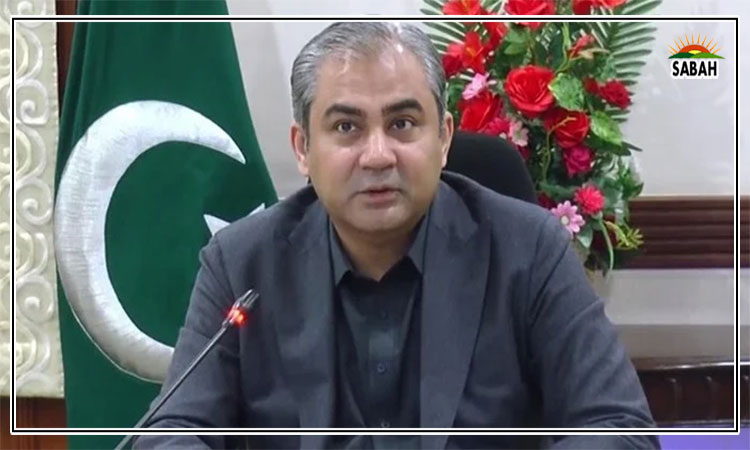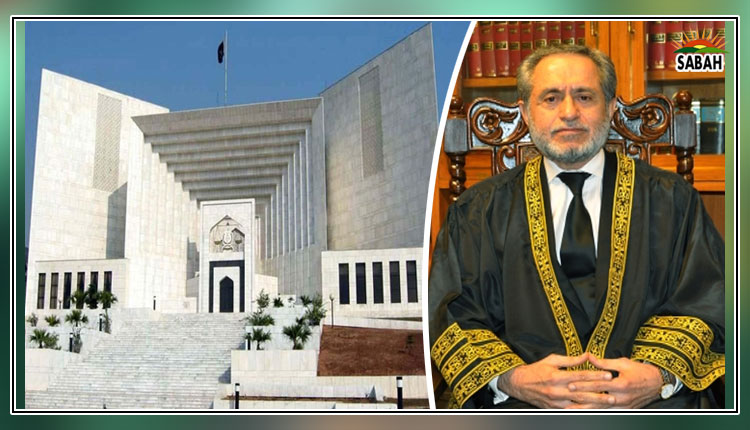Suspects from the May 9 incidents have no affiliation with the armed forces: Justice Jamal Khan Mandokhail
ISLAMABAD, Jan 08 (SABAH): The Constitutional Bench of the Supreme Court of Pakistan on Wednesday resumed hearings on an intra-court appeals challenging the military court trials of civilians, with Justice Jamal Mandokhail remarking that the suspects from the May 9 incidents have no affiliation with the armed forces.
A seven-member constitutional bench, led by Justice Aminuddin Khan and comprising Justices Jamal Khan Mandokhail, Muhammad Ali Mazhar, Syed Hassan Azhar Rizvi, Musarrat Hilali, Naeem Akhtar Afghan and Shahid Bilal Hassan, conducted hearing on the 39 intracourt appeals.
Senior Supreme Court lawyer Khawaja Haris Ahamd, representing the Ministry of Defence, initiated arguments, asserting that the court’s earlier decision hinged on Article 8(5) and 8(3) of the Constitution, which he argued are distinct and cannot be conflated.
Justice Mandokhail urged Haris to move forward with his arguments, stating, “Your point was understood yesterday; now, proceed to complete the remaining arguments.”
Reading from the decision nullifying civilian trials in military courts, Haris pointed to the precedent set in the FB Ali case, asserting that the ruling permitted civilian trials under military jurisdiction. However, he contended the interpretation of Articles 8(3) and 8(5) was flawed in the majority judgment.
The defence lawyer emphasised that FB Ali’s case was unique, involving a retired officer prosecuted post-retirement when he was a civilian. Justice Mandokhail responded, “In the present case, the May 9 suspects have no ties to the armed forces. They are neither ex-servicemen nor civilians with military links.”
Justice Musarrat Hilali remarked that the trial of civilians in military courts was for the criminals like APS, can all civilians be treated the same way? Justice Hilali remarked the Constitution of Pakistan is not suspended. The lawyer replied that fundamental rights remain, and there are court decisions.
She asked the lawyer whether all fundamental rights are suspended when one comes under the Army Act.
Justice Jamal Mandokhail asked if the military court will try those [civilians] who attack army soldiers. Khawaja Haris responded that this case is not about determining who can be tried in the future.
Justice Mandokhail remarked that it is said that the parliament is supreme, “but in my opinion the Constitution is supreme.”
The justice observed that parliament indeed has the power to make laws defining what constitutes a crime. If parliament wishes, it can make a law stating that looking at someone with a crooked eye is a crime. Parliament also has the constitutional responsibility to establish the court where this crime will be tried. The Constitution of Pakistan grants parliament this authority and responsibility.
As proceedings started, Khawaja Haris, argued that the judicial decision is based on Articles 8(5) and 8(3), and that both sub-articles are entirely different and cannot be combined.
Justice Mandokhail stated that according to the Constitution, rules can be suspended but not abolished, and rights cannot be suspended under Article 5.
Khawaja Haris argued that Article 233 has two parts: one deals with the Armed Forces and the other with civilians.
The counsel read the decision which declared the military trial of civilians void and stated that the F.B. Ali case had already settled that civilians could also be tried by military courts. He argued that the majority decision misinterpreted Articles 8(3) and 8(5).
He said that it was wrongly stated that the F.B. Ali case was of a different nature, as the trial was held after his retirement. The judgment stated that his case was different because he was not retired when the crime occurred.
Justice Mandokhail remarked that in this case, the suspects of May 9 riot are not part of the Armed Forces. These days, the term “ex-servicemen” is used, but they were not even ex-servicemen. Let us use the term “civilian.”
Justice Jamal Khan Mandokhail asked him whether civilians can be tried under the Army Act. Is this only for specific civilians? The counsel replied that the general impression is different, but the justice intervened and repeated his question: “can civilians be tried or not?”
Justice Naeem Akhtar Afghan while addressing Khawaja Haris said that the five-member bench had declared some provisions of the Army Act void. If we also keep these provisions void, civilians cannot be tried in special courts. If we reach another conclusion, we will have to decide which civilians can be tried in special courts.
Justice Naeem Akhtar Afghan stated that there have been amendments to the Official Secrets Act in 2023. He asked how these amendments should be considered.
During the hearing convict Hassan Khan Niazi’s father Hafeezullah Khan Niazi complaint that the convicts have been kept in solitary confinement and they are not meeting with their lawyers and relatives. The bench has directed the Additional Advocate General Punjab Wasim Mumtaz Malik to present report regarding the matter by tomorrow (Thursday). Khawaja Haris will continue his arguments tomorrow (Thursday).












